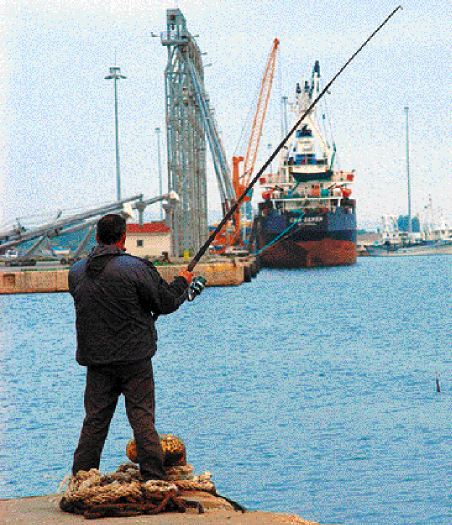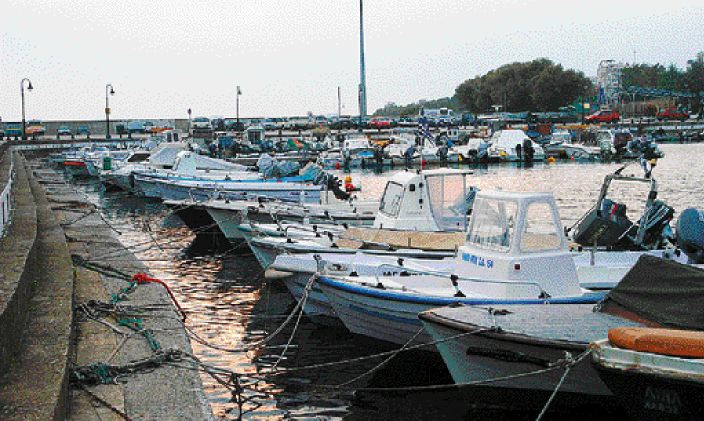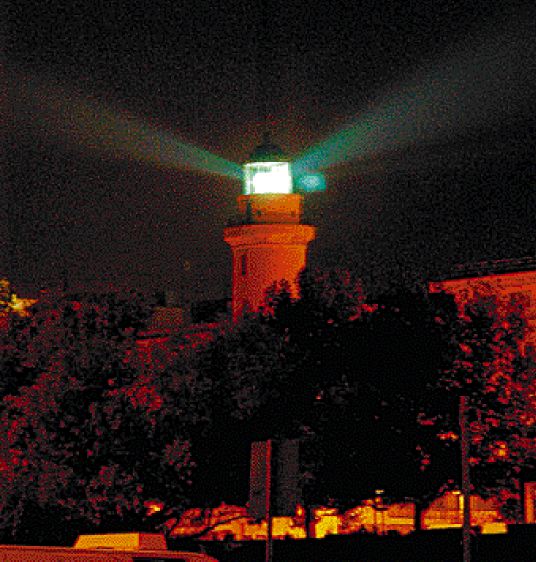 |
||
|
Alexandroupolis: A Fortune Revived A cross-pipeline potential sees to exciting prospects for the northeastern town which was once a stop on the Silk Route and Orient Express |
||
|
By Brian Williams Maybe, but still just maybe, Europe's self-proclaimed first town across the border from Asia, Alexandroupolis is poised again to live up to its crossroads, or rather cross-pipeline, potential. But this time it is not just the northeastern Greece town, named after legendary conqueror Alexander the Great, that sits on the brink of a destiny determined by its location on the warm Aegean Sea and where borders of Greece, Turkey and Bulgaria touch. Russian hopes of becoming an even greater supplier of oil to Europe and even possibly extending its reach to the United States and southeast Asia; Turkey's drive to move from Asia into Europe as part of the European |
 Awaiting the big catch |
|
|
Union; and a daunting test of the EU's ability to expand, all meet in a spider web of oil and gas pipelines that start in Russia and Azerbaijan, and run through Turkey and Bulgaria, to Alexandroupolis.
The success of the underground pipelines, indeed even just their implementation as a symbol of cooperation, is key for the strategic and economic plans of the countries as well as other Balkan, Black Sea and Mediterranean neighbours. Higher oil prices and the urgent need for new routes to bypass the congested Bosporus Straits in Turkey are among the key drivers of the projects whose time does indeed seem to have come after years of delay. More directly and immediately, success will spell a revival of the fortunes of a city where unemployment is at least 15 percent, a stark contrast to its wealthy past as a stop on the Silk Route and Orient Express. Talking to Alexandroupolis mayor and business leaders it is hard not to get caught up in the surge of optimism about the future that is sweeping a city long held back in recent times by its menacing location on the always uneasy border with Turkey. |
||
|
Alexandroupolis Mayor George Alexandris has no doubts the good times are about to roll again for his city of 75,000, comparing the expected economic boom from the pipelines to "what North Sea oil set off in Scotland". "We have no doubts our population is going to at least double in the next years and Alexandroupolis will become Greece's third biggest port behind just Piraeus and Thessaloniki," he told the Athens News in an interview two days after his reelection for another four-year term. |
 In the next few years Alexandroupolis is to become Greece's third biggest port behind just Piraeus and Thessaloniki |
|
|
His optimism is shared by Alexandroupolis business leaders who have no hesitation in sending out their own and updated call of centuries ago to an infant United States to "Go West Young Man". "Go North Young Man and Woman," Alexandroupolis Chamber of Business leader Nicos Dasterdis told the Athens News in another interview. "If you don't come to northern Greece now you'll lose out?" Is it all pie in the sky, a false dawn for Thracian hopes of returning to glories of the past, or fulfilment at last of the potential of Alexandroupolis' key strategic location? As 2007 has moved in, the stars seem to be aligning and signs are looking good. Greece expects to start receiving gas from a pipeline running from Azerbaijan through Turkey to Alexandroupolis in mid-2007. Starting with a capacity of 3.5 billion cubic metres per year, the pipeline plans to eventually nearly quadruple the volume reaching an annual 11.5 billion cubic metres. From Alexandroupolis, the gas will be shipped domestically and eventually by pipeline under the sea to Italy. The more strategic and commercially lucrative project - a pipeline to carry Russian oil from the Bulgarian town of Burgas to Alexandroupolis - also seems to have the wind behind it at last, though arrival of the first black gold is still several years away even if things go well. After 13 years of debate, a political agreement was signed between the three countries late in 2006 to go ahead and financing of the 1 billion euro project appears to be falling into place with promises in recent weeks of EU and Russian money. For emerging energy giant Russia, the oil pipeline would open the way for a platform for Moscow to supply western Europe with more than the one-quarter of the demand it at present fills. Sergei Bogdanchikov, head of the state-run Russian oil company Rosneft, has also said the pipeline would give Moscow access to new world energy markets. "The new oil pipeline will make supplies to America and Southeast Asia possible because the deep-sea port in Alexandroupolis allows such supplies to be made," he forecast. There is a certain symmetry to Russians, being among the key players in reviving Alexandroupolis fortunes because it was they who mainly laid the groundwork for the present day graceful city of 75,000 people. Once a small backward fishing village, 350km from Thessaloniki and 770km from Athens, the town's first spurt of growth started back in 1871 with the arrival of the Macedonian Railway. Within a few years it had become a commercial hub and stop on the Orient Express to then Constantinople. Peopled by Greeks, Turks, Armenians, Bulgarians, Jews and Franks, the harbour was also filled with large Russian and English ships expanding trade outside the region. In 1878, Russian forces took control of the city for two years when they arrived in the town after defeating the Turks in the last Turk-Russian war. |
||
|
Eager for quick movement of troops through the town to protect their interests, the Russians set about a makeover that emphasised wide avenues that ran parallel to each other, avoiding the cul de sacs and narrow alleys of Ottoman-ruled times. A French-designed lighthouse added to the city's appeal and still stands in near-pristine condition as a sentinel of a harbour that is at present still mainly a backwater though already staring to show new signs of life with ferries planned to Lesvos, Thessaloniki and even Izmir in Turkey next year. The arrival of an expected 35 million tonnes of Russian oil annually would turn the harbour into a site where up to 30 of the world's largest oil tankers - 300,000 tonnes behemoths - would load each month. Add in huge oil storage tanks and treatment facilities for the tankers either in the port or offshore and it is easy to see why Alexandroupolis mayor and business leaders are licking their lips. |
 A French-designed lighthouse added to the city's appeal and still stands in near-pristine condition as a sentinel of a harbour that at present is still mainly a backwater |
|
| "There are so many knock-on effects for business here from the oil," Chamber of Business leader Dasteriadis said. "Housing, transport, tourism, you name it. Thousands of jobs will be created. Shipping companies will establish offices, there will be too much work for oil industry subcontractors. With oil in our town maybe a plastics industry will develop." Some infrastructure is already in place. Rail, air and road links to Europe and other parts of Greece have been upgraded to the extent that what was just a few years ago a torturous seven-hour drive from Thessaloniki now takes just half that time on an all-weather multi-lane highway. Ahead is an upgrading and deepening of the harbour and construction of a loading platform seven miles offshore. "Our time has come," Mayor Alexandris says. Photos by Peter Charles |
||
(Posting date 16 February 2007)
All articles of Athens News appearing on HCS have been reprinted with permission. |
||
|
||
|
2000 © Hellenic Communication Service, L.L.C. All Rights Reserved. http://www.HellenicComServe.com |
||

